

Net Threats. Experts say liberty online is challenged by nation-state crackdowns, surveillance, and pressures of commercialization of the Internet As Internet experts look to the future of the Web, they have a number of concerns.
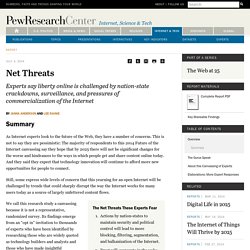
This is not to say they are pessimistic: The majority of respondents to this 2014 Future of the Internet canvassing say they hope that by 2025 there will not be significant changes for the worse and hindrances to the ways in which people get and share content online today. And they said they expect that technology innovation will continue to afford more new opportunities for people to connect. Still, some express wide levels of concern that this yearning for an open Internet will be challenged by trends that could sharply disrupt the way the Internet works for many users today as a source of largely unfettered content flows.
The Net Threats These Experts Fear. How Do I Protect Myself Against Malware? The best way to deal with a malware attack is to avoid getting infected in the first place.
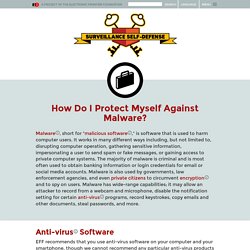
This can be a difficult feat if your adversary has access to zero day attacks—attacks that exploit a previously-unknown vulnerability in a computer application. Think of your computer as a fortress; a zero day would be a hidden secret entrance that you do not know about, but which an attacker has discovered. There are many ways in which an attacker might try to trick you into installing malware on your computer. For example, in Syria, pro-Assad hackers targeted members of the opposition with malware hidden in fake revolutionary documents and a fake anti-hacking tool. The best way to avoid being infected with this kind of targeted malware is to avoid opening the documents and installing the malware in the first place. FTC sees privacy threats in the 'Internet of Things' - Katy Bachman - POLITICO.
As consumers buy up fitness trackers, Internet-connected thermostats and even Web-enabled cars and toothbrushes, the Federal Trade Commission has a message: It’s watching.
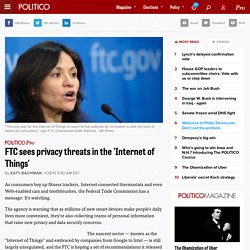
The agency is warning that as millions of new smart devices make people’s daily lives more convenient, they’re also collecting reams of personal information that raise new privacy and data security concerns. Story Continued Below The nascent sector — known as the “Internet of Things” and embraced by companies from Google to Intel — is still largely unregulated, and the FTC is hoping a set of recommendations it released Tuesday will goad companies into building consumer data protections into their systems. Mobile Malware: Small Numbers, but Growing. THE warning was dire: A small security company revealed a flaw in millions of smartphones that could allow dangerous software to masquerade as a legitimate app and seize control of a phone.
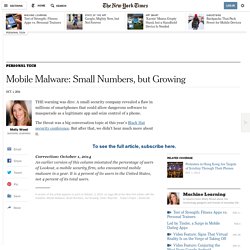
The threat was a big conversation topic at this year’s Black Hat security conference. But after that, we didn’t hear much more about it. Perhaps that should not be surprising. Technology - Malware and Viruses. Malware. Malware, short for malicious software, is any software used to disrupt computer operation, gather sensitive information, or gain access to private computer systems.[1] Malware is defined by its malicious intent, acting against the requirements of the computer user, and does not include software that causes unintentional harm due to some deficiency.
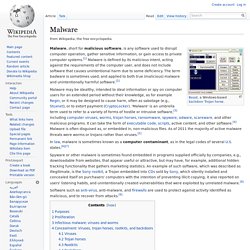
The term badware is sometimes used, and applied to both true (malicious) malware and unintentionally harmful software.[2] In law, malware is sometimes known as a computer contaminant, as in the legal codes of several U.S. states.[6][7] Spyware or other malware is sometimes found embedded in programs supplied officially by companies, e.g., downloadable from websites, that appear useful or attractive, but may have, for example, additional hidden tracking functionality that gathers marketing statistics.
Bank Hackers Steal Millions via Malware. Photo PALO ALTO, Calif. — In late 2013, an A.T.M. in Kiev started dispensing cash at seemingly random times of day.

No one had put in a card or touched a button. Cameras showed that the piles of money had been swept up by customers who appeared lucky to be there at the right moment. But when a Russian cybersecurity firm, Kaspersky Lab, was called to Ukraine to investigate, it discovered that the errant machine was the least of the bank’s problems. The bank’s internal computers, used by employees who process daily transfers and conduct bookkeeping, had been penetrated by malware that allowed cybercriminals to record their every move.
Then the group impersonated bank officers, not only turning on various cash machines, but also transferring millions of dollars from banks in , , Switzerland, the United States and the Netherlands into dummy accounts set up in other countries. Continue reading the main story Transferring money into hackers’ fraudulent bank accounts fraudulent accounts overseas Mr. The Five Biggest Threats to Your Kids’ Privacy, and What You Can Do About Them. Remember back in school, when your teachers warned that everything you did would go on your permanent record?

It turns out your teachers have become right. That permanent record is the Internet. It’s hard to be a fully functioning adult in 2014 and not leave behind a digital trail. Now imagine how hard it is for your kids, who have never known a world where the net did not exist.